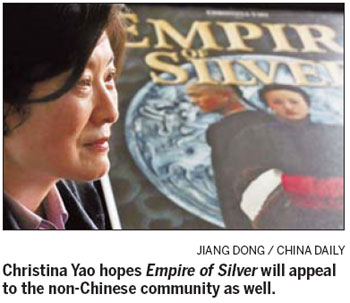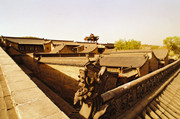Movie on Shanxi merchants gives director lesson on family history
By Kelly Chung Dawson ( China Daily )
Updated: 2011-06-24
Researching and making the epic film Empire of Silver, which depicts a high-stakes tale of power and romance among the renowned Shanxi merchants in the late 19th century, was an eye-opening experience for first-time director Christina Yao in more ways than one.
Loosely based on the best-selling trilogy Valley of Silver by novelist Cheng Yi, the film taught Yao not only about the rich history of the influential merchant class but also of her father, whose upbringing in a wealthy Shanxi merchant family shaped the life he led in both politics and in his personal life.
"Growing up, I didn't fully realize what it meant to be a Shanxi merchant," she says. "They were incredibly powerful. And through researching this book, I realized more about my father. He and his father and grandfather were all monogamous, even though many of their peers had second wives. I thought it was their virtue, but I realized that the Shanxi merchants were truly unique in that in all of China's thousands of years, (they) were the only group that demanded monogamy."
Empire of Silver, released in China in 2009, opened in 17 theaters across five cities in the United States in early June. The film shows how the Shanxi merchants were at one point part of a powerful mercantile triumvirate that included the Venetian and Jewish merchants. Their wealth and power afforded them a jet-setting lifestyle, which Yao tried to capture by filming in four provinces, 13 cities and on 46 sets.
Yao, who was born in Taiwan, formerly served as director of the American Conservatory Theater in San Francisco. The film is written, produced and directed by her. She believes that the film's core message champions the importance of ethics, a particularly important theme in troubled economic times, she says. The characters at the center of Empire of Silver lived in similarly difficult times, facing various threats to their standing, including the Boxer Rebellion and revolutionary forces.
While the strong personal ethics of the group were a part of their cultural fabric, their tradition of monogamy also ensured that power within each Shanxi family really rested at home with the wife, who closely managed both the household and its finances with a tight grip.
"What these people had done was that they set up a very good system; they somehow curtailed human weakness into a flourishing business structure that encouraged good behavior," she says.
But that tight fabric is pulled apart by a series of tragedies within the family, forcing Lord Kang (played by Zhang Tielin) to consider his least favorite son, the more ethical and honest Third Master (Hong Kong singer and actor Aaron Kwok) as the heir to his business. Complicating matters is Third Master's love for his stepmother (actress Hao Lei).
"When I was writing the movie, I thought through the classic family stories, and I realized that Hamlet, King Lear, even The Godfather - even though they're not always defined this way, they are ultimately succession stories," Yao says.
"Within any power structure, the torch passing is always the crisis point and therefore the dramatic point. I decided that this would be a succession story, too."
The movie has done relatively well with US audiences, says Gary Springer, who handles public relations for the film.
"It's a beautiful film, with a first-time director who makes a $10 million budget look like a $100 million budget. It seems to be working," he says. "I think there's growing awareness of, and access to, Chinese films because more and more Chinese movies are being made."
It's common for foreign films to take several years to reach American audiences, Yao says. So far, audiences have mostly been of Asian-American descent, she says.
"We have been trying to break out of the Chinese community," she says. "Our main focus for this release was to hope that the world outside the Chinese community would learn about it and watch it. We have seen some non-Chinese people coming in, but not the large numbers we'd hoped for."
China Daily

(China Daily 06/24/2011 page18)




